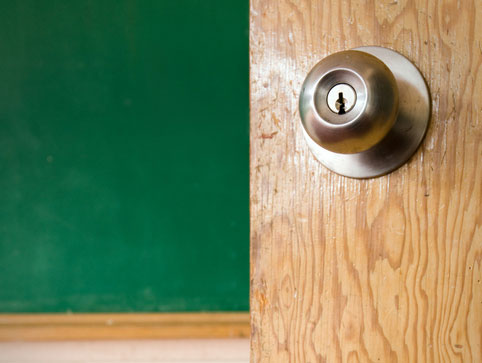Educating Kids with PTSD
10/17/2019

Some years ago, a student entered my classroom.
It is never unusual for a Special Education Teacher to hear a knock on the door and have a new student and their family member standing there, along with a school representative, waiting to enter your classroom.
Such was the same for this child whom I will call Tommy.
Tommy was a cherub-faced eight-year-old boy (maybe. We keep identities hidden and safe here).
He had rosy cheeks, brown hair, and deep brown eyes. His slumped shoulders and frown told me a lot of what I needed to know: Tommy was a child with something weighing heavily on his heart and anyone could see that he was wearing the scars of a very burdened life.
Within minutes of meeting the caregiver at my door, I had been informed that young Tommy had been abused by family members on multiple occasions.
In anecdotal records, Tommy was identified as having Shaken Baby Syndrome and the implications of that were an unsteady gait and other motor issues which resemble Cerebral Palsy. Tommy also had significant learning disabilities, memory difficulties, speech processing delay, and the symptoms of a Traumatic Brain Injury.
It was made evident that this child was a child who, by accident of birth, was not being nurtured and cared for in a way that would allow for optimal development.
From my perspective, this sweet young one had never known a loving home life.
Educating Young Ones Who Live With Post Traumatic Stress Disorder, Diagnosed Or Not

With each passing school year, we have more and more kids crossing the thresholds of our classroom doors who are carrying proverbial tons of trauma.
Personally, I have had students come to me having witnessed a parent being murdered; children who've endured their parents' acrimonious divorces; children whose parents are addicts; children who have been placed in foster care for too many reasons to enumerate; being a victim of abuse or witnessing abuse; children who have lost a beloved family member; children who have been victims of rape or incest; victims of war; victims of natural disasters (floods, tornadoes, fire, etc.).
Studies show that approximately 15%-43% of girls and 14%-43% of boys endure some form of childhood trauma.
From these numbers, it can be derived that 3%-15% of girls and 1%-6% of boys manifest Post Traumatic Stress Disorder.
It all makes me beyond angry and it makes my heart ache for these poor babies who don't just endure the stuff of life-the loss of a beloved family member or pet, a fire, a flood-but so much more.
In too many cases, the trauma is at the hands of the ones who are intended by nature to care for them, to love them, and to be supportive of them through a crisis.
Instead, they are opting to be the perpetrators of the problems.
The family members who are supposed to love are, in many cases, choosing to hurt.
Why? Just…why? Ugh.
Then these precious ones are brought to us and we are given seven-to-nine hours a day to do our best to educate them while doing everything we can to love and support them.
And we do.
In addition to their trauma, children with diverse and specific special needs are well aware that they have to work twice as hard to get half as far.
This is their norm. This is their reality. It is something to which they are accustomed.
Factor in these complex issues, whether or not the child has been officially diagnosed with PTSD. The Teacher becomes therapist, counselor, nurturer, Social Worker, confidante, Psychologist, and friend.
And you want us to teach Math? You want us to ensure each child is excelling on a standardized test?
Girl, please.
We Need Strategies!

Let's talk about how to help and how to support because the "experts" aren't in our classrooms but hurting children are.
First, we have to know what we're typically going to see from children who are manifesting signs and signals of trauma. The "experts" agree that the following are typical indicators:
- Reliving specific events during routine play
- Nightmares
- Negative attitude
- Avoiding particular places or types of places
- Outbursts of anger or crying
- Cutting
- Statements about wanting to self-harm
- Claims of hopelessness
- Skittishness or "jumpiness"
- Inability to recall relevant parts of the event
- Lasting worries
- Self blame and doubt
- Feelings of shame, anger, fear, and guilt
- Detaching from people who were previously important to them
- Sleeplessness
- Drug use
Of course, each person is an individual and will respond and react differently and uniquely to their trauma.
What We May Do
- Support efforts being made by the child with Cognitive Behavior Therapy.
- Support any mental health efforts by professionals at school.
- Become informed (and share the information as appropriate) about Eye Movement Desensitization and Processing Therapy.
- Offer safety and security through love and compassion, and allow them to talk with you when they are ready.
- Encourage them as they demonstrate strength through accepting new challenges such as breaking out of a routine.
- Offer reassurance that their feelings are okay.
- Given kids opportunities to have control over things. In the classroom, this could look as simple as choosing the writing center or the reading nook, being the Pencil Sharpener Person or the Recycling Chief, working at your desk or at the table.
- Provide opportunities for genuine success. Call on them to answer questions when they signal, invite them to assist you with tasks, do a presentation of any kind as an "expert," etc.
- Have well-organized and peaceful, predictable transitions. Posting a daily schedule relieves a lot of stress!
- When it's necessary to redirect a child, remember this adage: Praise in public, reprove in private.
- Yoga!!! Just YOGA! I promise, it helps so much. I absolutely love Cosmic Kids Yoga on YouTube.
- Go easy (light, if at all) on the homework. No need to add additional stressors.
The Reality Of It All Definitely Matters

- PTSD is a mental health issue and needs to be addressed accordingly. Children with PTSD have a higher risk rate for suicide, depression, and anxiety.
- PTSD has been an entry in the book Diagnostic and Statistical Manual of Mental Disorders since the early 1980s, but there hasn't been much research done to identify which medications may be best suited for pharmacological support.
- These children need our support. We will do our best to support them but we, as Educators MUST KNOW OUR STUFF. Read and read some more! Nothing ticks me off faster than hearing a Teacher say, "I have a student who has moved 15 times in a year. I don't get why they just can't behave at school! It's the one place where things are the same every day!" Uhh…duh…
- PTSD diagnosis tools exist on the Internet…what ISN'T on the web? Review it and familiarize yourself with what lies therein. Thought provoking…
- Learning issues may be evident in children with PTSD even if they weren't prior to the event. Grades may drop. Suspensions and behavior referrals may rise.
- Health issues-constantly being sick-may become problematic. When kids endure trauma, their Fight or Flight response is chronically triggered. This can lead to heart issues, elevated blood pressure issues, Diabetes, and other associated issues.
- Drug dependence can occur.
- Sexuality increase or inappropriate sexual behaviors become evident.
Moving Forward

Even if Tommy has the appropriate and abundant support that is so richly deserved, I wonder if there will ever be a semblance of normalcy in this child's life.
EVER.
I'm unsure of how my peers may feel as Educators in this modern era, but often it seems we are trained professionals for everything which, in our world today, doesn't seem to matter as much as it might have 60 years ago.
Yes, reading, writing, and Math are critically important but if a kid is worried about a non-custodial and physically abusive parent coming to pick them up unexpectedly at school, well, Math suddenly takes a back seat. Anxiety reigns supreme.
I need to be a therapist.
I need to be a Lawyer.
I need to be loving Grandma.
I need to be a nurse.
I need to be a Social Worker.
I need to be a Nutritionist.
I need to be a provider of encouragement.
I am all of these.
I am a Teacher.
- Dear Novice Teacher:An Open Letter About What You Really Need To Know For a Successful Teaching Career - November 9, 2021
- I Never Forgot What It Felt Like to Struggle in School… So I Decided to Become the Teacher I Always Wished I Had - October 8, 2021
- The Issue of Bullying Students with Disabilities Hits Particularly Close to Home for Me - August 16, 2021









